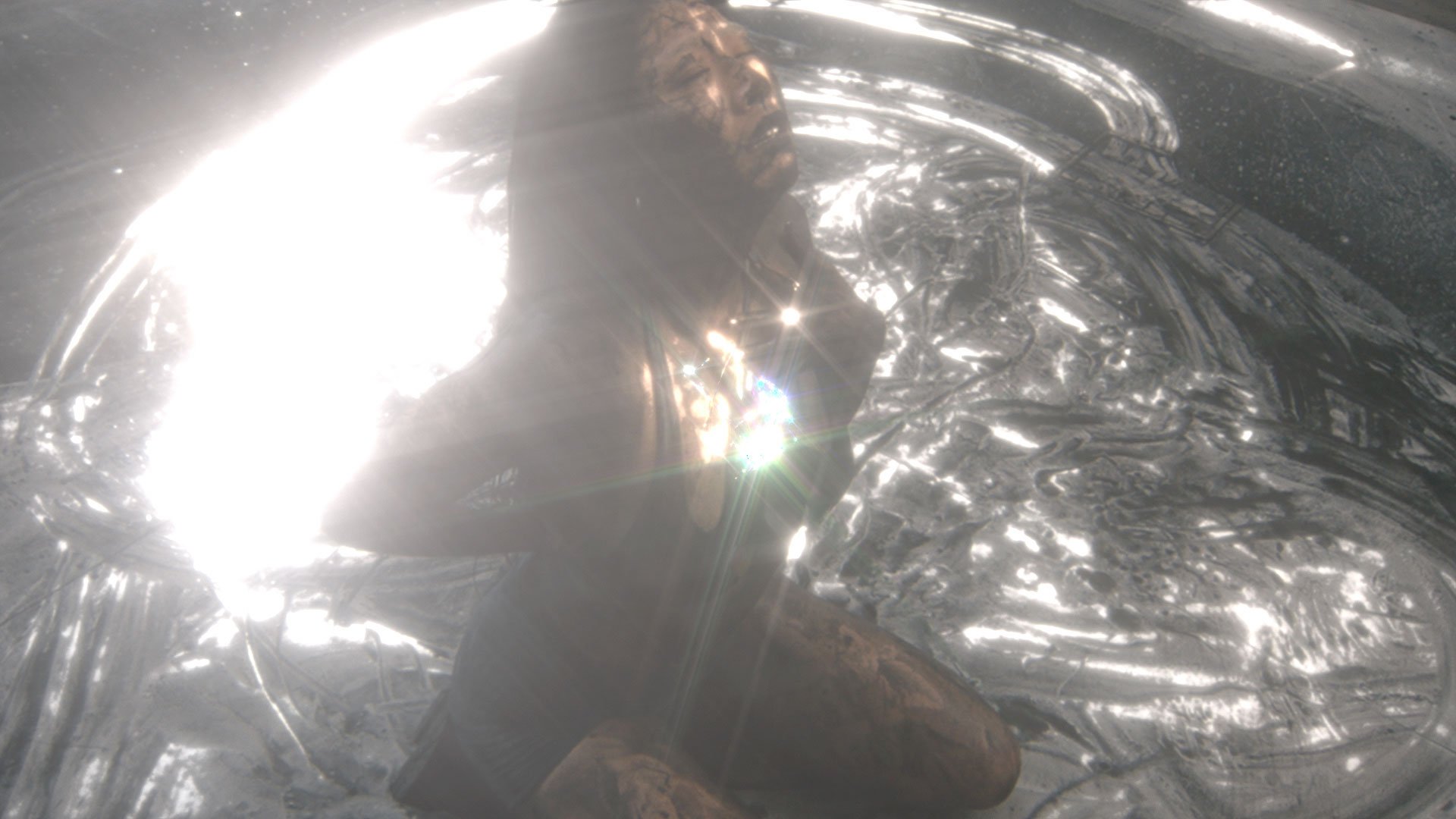Rieko Whitfield
London-based Japanese-American artist Rieko Whitfield’s witchy music echoes from another world, where ashes grow into phoenixes, where her echoing incantations draw you into her spell. Having built a cult following in London from her performances in venues including the Institute of Contemporary Arts, the Victoria and Albert Museum and FOLD, Rieko is about to invite you into the ethereal landscape of her debut EP, Regenesis.
Hi Rieko, can you tell Coeval about your artistic practice? When did it begin?
I am an artist, musician, and self-described “experimental pop witch.” My debut EP Regenesis is a speculative mythology of rebirth and collective healing.
I’ve been building worlds before I even learned to speak. I was obsessively drawing spiritual entities and cosmic portals on paper, and this expanded to music when I started playing the violin at four years old. I was classically trained growing up, but I composed my own melodies when I thought no one else was listening. It wasn’t until I picked up my first guitar that I fell in love with songwriting. I was journaling religiously as part of my practice and playing gigs around my hometown in California. When I wasn’t writing or performing, I was painting or photographing my friends.
I spent most of my adult life drifting around Europe and Japan, sometimes in the art world and sometimes not, but it was when I started my postgraduate degree at the Royal College of Art that I could finally fully commit to my artistic practice for the first time. Now, I feel more aligned to my life’s mission than ever.
Most importantly, I’ve finally reached a point in my life where I believe my voice deserves to be heard. Regenesis was birthed in this spiritual awakening.
You’re a polymath – both a performance artist and a musician, how do you negotiate both forms and do they feed into each other?
I’ve always been a “jack-of-all-trades,” but with this comes a societal pressure to specialise in one thing. It’s been a conscious decision on my part to embrace the multiplicity of my identity, my skill sets, and my non-linear lifepath as a superpower.
Whether as a performance artist or as a musician, I think my greatest strength is my ability to turn a stage into a portal to another realm.
As a performance artist, I rarely ever just sing. The multisensory, almost synaesthetic aspects of my work, from set design to styling to choreography to lighting to scent is all part of the show. Sometimes I’ll dance on a floor covered in salt, drawing from Japanese purification rituals. Sometimes I’ll perform live reiki sessions to members of the audience. Sometimes I’ll ignite aromatic herb blends designed to open up the crowd to higher states of consciousness. Of course my music is at the heart of it all, but I see site-specific performance as live magic.
As a musician, the ritual of merely stepping on a stage with intention is powerful and transformative. I don’t know if I will ever understand it, but I know I have to respect it. It’s like being possessed, and I know the audience can feel it. When I first started performing professionally, I felt a need to put on a character. But the more I perform, the more I’ve merged my on-and-off-stage personas. I’m still navigating how to protect my energy, my body, my spirit, as I oscillate between realities.
It takes an immense amount of courage to put yourself in front of an audience and reveal your innermost truths, but I live for the fantasy, the seduction, the magic.
How would you describe your own sound for people who haven’t heard your music?
I would call my music experimental pop, though someone once called it “ambient witchcraft” which I kind of love too. I blend heavily-distorted guitar and ritualistic techno beats with soundscapes using water and tuning forks. My vocals shapeshift from monstrous rage to whispered vulnerability across one verse. My songs are spells, and my lyrics are incantations.
Your debut EP is coming out in October. What was the concept behind it? What world have you built for us?
Regenesis is my four-track debut EP on life, death, rebirth, and embodying alternative futures. The single “Ashes to Ashes” drops 29 September with an art film serving as a music video, and the EP drops 14 October.
Regenesis has always been about world-building. It began as a three-act “opera” that I wrote and filmed throughout the pandemic in a makeshift home studio. As soon as the lockdowns lifted, I was delivering live performances of Regenesis in venues ranging from nightclubs to museum lates – from the club night GGI 끼 at the Yard to the Victoria and Albert Museum for a recent Friday Lates. Along the way, I knew I had to properly flesh out and record the music.
The opera was initially inspired by a Shinto creation myth about a goddess who burned to death giving birth to the world, and was sentenced to eternity in purgatory. I wanted to imagine this deity being called back into our realm of existence at a time after the apocalypse, and consider the kind of values we need to breathe new life into our communities – through meditation, self-expression, and conscious collective action. The body does not abide by self-imposed limitations of linear time. When we release ourselves into a constant state of rebirth, we all have the power to embody our highest potentials.
I was also interested in the trope of the “angry woman” in traditional Japanese storytelling, specifically in Noh theatre, where women lose their humanity and become chimeric monsters when they fall outside the confines of innocence or nobility. But then I thought, what’s wrong with being a chimaera, a monster? We need to make space for rage, for grief, for feeling at the expansive spectrum of what makes us human, if we ever hope to make space for a more empathetic world.
In this way Regenesis is a chimeric queerness, a liquid multiplicity, a collective rebirth, and a proposition for radical optimism.
Your EP is a feat to your skills, with your self-production and your own writing. What’s your creative process been while creating the EP?
I think, if anything, I have a good eye for talent, and the ability to align people towards a bigger vision. Though I am meticulous about every detail in both the sonic and visual production, I allow space for collaborative experimentation, to retain a sense of play. I feel blessed to have such a beautiful community of artists involved in this project, including my co-creative directors Mika Kailes for the Regenesis photoshoot, and Deividas Vytautas for the music video for my single “Ashes to Ashes.” As I’ve approached this EP as a visual artist, I see all of this as part of my world-building practice. It takes a village to raise an experimental pop star.
Production aside, the writing process to me is sacred. When I write, I am channelling from a spiritual source. The entirety of Regenesis came to me in something like a psychic download, from the lyrics to the melodies to the sounds, and it was my job to figure out a way to make it happen. Of course, in its execution, I am influenced by my own emotions and experiences, but my work is never really for me. I feel like I’m a vessel for what people need to hear right now, and I just have this deep sense of obligation to put Regenesis out into the world.
Your practice deconstructs Western concepts of individualism with folklore and Japanese mythologies that honour the collective. Can you tell me a bit about how they have shaped your work?
I am interested in what I call speculative mythology because the tales we repeat to ourselves and to each other reinforce who we are as individuals and as a collective. Stories are how we make sense of our world, and it’s imperative to remember that we have power over our own narratives.
I immigrated to the United States with my mother at a young age, so my identity was always as an outsider. I grew up speaking Japanese, but whenever I would go back to visit, I never felt Japanese enough. There was also little about American culture, with its cut-throat hyper-individualism at the epicentre of late-stage capitalism, that I identified with. After moving to Europe, I then moved to Tokyo for a few years. Living there as an adult for the first time, I felt like I could pin-point the philosophies that resonate with me – namely collectivism, animism, and a spiritual reverence of ancestral connection. From this vantage point, I could look back and derive new meaning from my own origin story.
I think if you’re marginalised in any way – and in my case if you’re a woman or femme-presenting, if you’re an immigrant, if you’re queer, if you’re neurodivergent, if you’re a person of colour – there are systems of oppression that constantly teach you to believe that your existence, and your stories don’t matter.
Regenesis became a way of working through my shadows, as an invitation for myself, and for the people who listen to my music, to take up space and reimagine alternate possibilities in our collective narrative.
Your songs focus on cycles – with Ashes to Ashes denoting a transformation that’s continual. How do rituals and cycles contribute to this sense of healing that’s present in your music?
A big part of my single “Ashes to Ashes” is expressing the need to decolonise ourselves from the illusion of linear time. I believe so many of our issues as a society stem from the ideology of infinite progress, in a rigid taxonomy of so-called “order”. We need to detach ourselves from this way of thinking.
There are multiple roles to play when it comes to social change – if one tears down the systems that oppress us, then another does the quiet work of rebuilding something new from the ashes. But this also means we all need to make peace with seasons of grief to release a way of life that no longer serves us.
When we can learn to let go of our idea of the past and future, we can rediscover a powerful sense of interconnectedness in the present. Our time on this planet is short, but we are eternal in our universal state of becoming.
As I say in the last verse of “Ashes to Ashes”:
We will find what we once knew
I was never separate from you
And in time, we will become
What are your plans for the future?
I’ve already written my next EP, and I’ve got a few collaborators in mind to help make it a reality. I’m so excited to get started on production.
In the meantime, I am free-falling toward the Regenesis release while cultivating a sense of peace and self-trust. My next big live performance will be on 27 July at Zabludowicz Collection. If you’re reading this and in London around this time, consider this your invitation to come see me in person.
https://www.zabludowiczcollection.com/events/view/music-performance-rieko-whitfield-ashes-to-ashes
interview CICI PENG
What to read next












